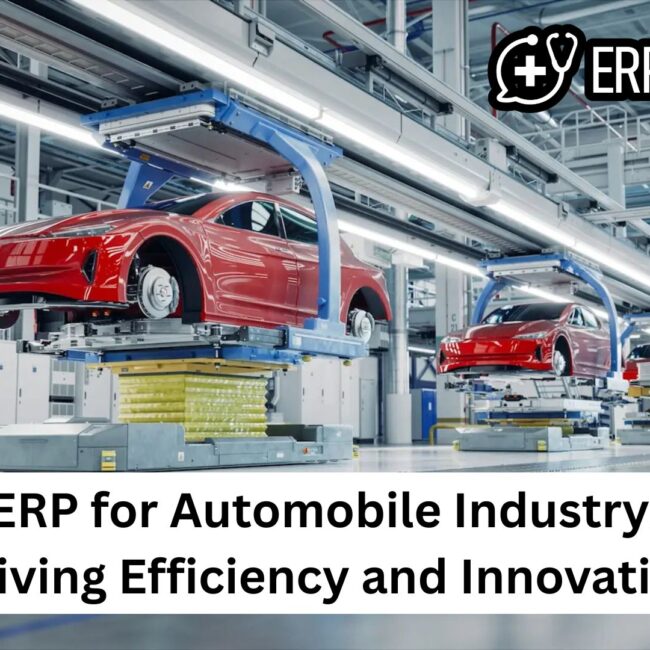
ERP on Pharmaceutical Industry: Transforming Pharma Operations for Future

ERP for Pharma: Solving Compliance, Efficiency, and Innovation Challenges
In today’s fast-evolving pharmaceutical landscape, efficiency, compliance, and innovation are critical to success. This is where ERP on Pharmaceutical Industry plays a game-changing role. By integrating processes, automating operations, and ensuring regulatory compliance, ERP solutions are empowering pharmaceutical companies to stay competitive and future-ready.
Why ERP on Pharmaceutical Industry Is Essential
Pharmaceutical companies deal with highly regulated environments, stringent quality standards, and complex supply chains. Without a centralized system, managing these elements becomes overwhelming. ERP on Pharmaceutical Industry offers a unified platform where production, quality, finance, inventory, and compliance are streamlined for maximum efficiency.
Key Benefits of ERP on Pharmaceutical Industry
✅ Enhanced Regulatory Compliance
ERP systems help pharma companies meet FDA, EMA, and WHO standards, ensuring accurate documentation, traceability, and audit readiness.
✅ Streamlined Production and Quality Control
ERP automates batch processing, material tracking, and quality checks, reducing errors and improving product consistency.
✅ Improved Supply Chain Management
With real-time insights into procurement, inventory, and distribution, ERP helps avoid stockouts and delays, ensuring timely product delivery.
✅ Cost Optimization
ERP reduces manual tasks, optimizes resource allocation, and improves financial visibility, helping pharmaceutical businesses control costs effectively.
✅ Data-Driven Decision Making
With centralized data, managers can generate reports, track KPIs, and make informed decisions faster, strengthening business performance.
How ERP Transforms the Pharmaceutical Industry
Implementing ERP on Pharmaceutical Industry transforms how companies operate:
- Batch Traceability: Track every batch’s lifecycle, from raw materials to finished goods.
- Electronic Batch Records (EBR): Eliminate paper records, reduce errors, and meet compliance requirements efficiently.
- Advanced Inventory Management: Maintain optimal stock levels, control expiry dates, and minimize waste.
- Integrated Financials: Monitor costs, manage budgets, and ensure accurate financial reporting.
Choosing the Right ERP for Pharmaceutical Industry
Not all ERP solutions are created equal. When selecting an ERP for the pharmaceutical sector, look for:
✔ Pharma-specific modules (quality management, regulatory reporting)
✔ Strong integration capabilities with lab systems and production equipment
✔ Scalable architecture to support growth
✔ Cloud-based options for remote access and flexibility
By implementing the right ERP on Pharmaceutical Industry, companies can align their operations with global best practices, unlock efficiency, and ensure they’re positioned for long-term success.
Common FAQs on ERP for Pharmaceutical Companies
1. What is ERP on Pharmaceutical Industry?
ERP on Pharmaceutical Industry refers to specialized enterprise resource planning systems designed to streamline pharma operations, ensure regulatory compliance, and improve efficiency across departments.
2. How does ERP help pharmaceutical companies stay compliant?
ERP solutions provide tools for batch traceability, electronic records, and regulatory reporting, ensuring pharma companies meet FDA, EMA, and global compliance standards.
3. What are the main benefits of ERP on Pharmaceutical Industry?
Key benefits include improved supply chain management, automated production processes, real-time data insights, enhanced quality control, and reduced operational costs.
4. Is ERP suitable for small pharmaceutical companies?
Yes, ERP on Pharmaceutical Industry offers scalable solutions, making it suitable for small, medium, and large pharmaceutical businesses looking to improve their operations.
5. How does ERP improve pharmaceutical inventory management?
ERP systems provide real-time visibility into stock levels, expiry dates, and material movement, reducing waste and preventing stockouts or overstocking.
6. Can ERP systems integrate with laboratory equipment?
Yes, many ERP solutions for the pharmaceutical industry offer integration capabilities with lab equipment and systems, enhancing data accuracy and process automation.
7. What modules are essential in ERP on Pharmaceutical Industry?
Important modules include quality management, production planning, batch management, inventory control, financials, and regulatory compliance management.
8. How long does it take to implement ERP in a pharmaceutical company?
Implementation timelines vary but typically range from several months to a year, depending on company size, complexity, and customization needs.
9. What challenges can ERP help solve in the pharmaceutical sector?
ERP addresses challenges like fragmented processes, manual errors, regulatory risks, inefficient supply chains, and lack of real-time visibility.
10. Why should pharmaceutical companies invest in ERP now?
With increasing competition and strict regulations, investing in ERP helps pharma companies stay agile, compliant, and prepared for market demands.
Final Thoughts
In a sector where precision, compliance, and speed are non-negotiable, ERP on Pharmaceutical Industry is no longer a luxury — it’s a necessity. With the right ERP system, pharmaceutical businesses can confidently navigate regulatory landscapes, streamline operations, and drive innovation.







